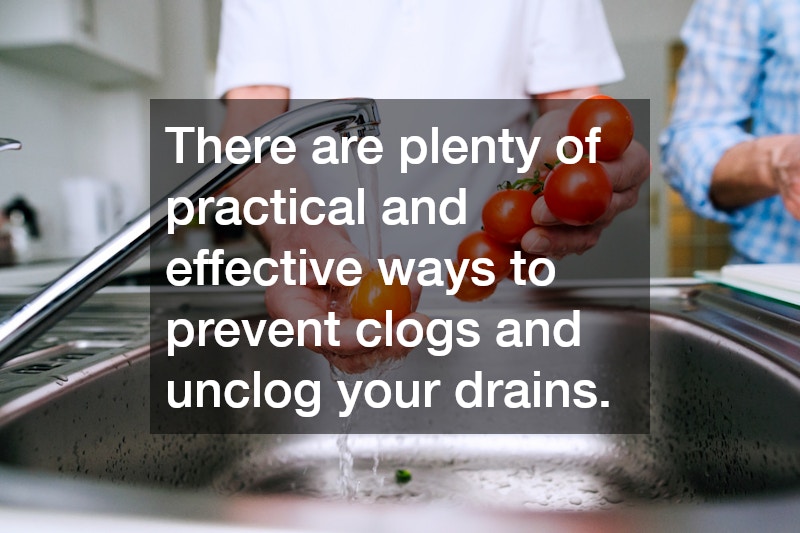
At some point, everyone, whether you rent or own your home, has dealt with clogged drains. You once started out with free-flowing sink drains, but after a while, you noticed that water was not going down as fast in your kitchen drain, bathtub, or bathroom sink. It’s annoying to go back into your bathroom or kitchen an hour later and find old, dirty, and nasty water floating around from the last time you were there.

The good news is that there are plenty of practical and effective ways to prevent clogs and unclog your drains. These drain cleaning tips are not only easy to follow but also highly effective to maintain clean pipes.
• Food, grease, and other waste should be put in a garbage disposal or trash car rather than your kitchen sink.
• Put a hair catcher or strainer in your bathtub to keep your drains from becoming clogged.
• Pour a half gallon of bleach down your drains monthly as a drain remedy.
• Run hot water down your drains for three to five minutes once a week to help clean the pipes in your sinks.
• Don’t put anything in toilets other than toilet paper. Bath wipes, paper towels, and feminine pads can clog them.
• Use a plunger.
• Use a drain cleaning chemical like Draino, Liquid Plumr, or Green Gobbler.
Fixing pesky leaks can do wonders for a household. The average household’s leaks account for more than 10,000 gallons of wasted water every year, roughly the amount needed to wash 270 laundry loads. The leaks in the average house are everywhere too. Ten percent of homes have leaks that waste 90 gallons of water a day or more and toilets account for 25 to 30 percent of household water use.
To reduce water waste and to optimize a household plumbing system, drain cleaning is important. Drains may get clogged with debris over time and can lead to a wide range of problems including flooding, leaking and smells.
There are many signs of a clogged drain and it’s important to stay on the lookout for potential hazards. Ignoring a clogged drain can lead to future problems and potentially costly plumbing installation.
Identifying the Problem
Signs of a clogged drain include:
- Slow Drainage: A sink full of water is often a sure sign of a clogged drain and it’s important to watch all drains to see if they are draining properly.
- Bad Smells: Odors, especially unwanted ones, are usually a dead giveaway to a plumbing problem. Waste builds up in pipes and the accumulation of bacteria and mildew can do quite a bit of damage. Professional plumbing services can fix some of these issues with plumbing installation, but it’s important to keep an eye out for signs of wear and tear.
- Rust: Rust is another strong indicator of a problem and the formation of rust around a metal drain is a bad sign. Rust usually occurs when iron is exposed to air and water.
-
Caring For Your Drains
Now that a clogged drain has been discovered, how do you go about fixing the problem?
The importance of draining cleaning can’t be understated and it’s important to know proper methods of draining cleaning for the different types of drains in your house.
-
- Kitchen Sink Drains: Too often there’s the temptation to push food scraps into the drain and that’s an easy path to a clogged pipe. The only substances that are good for a drain are soap and water. Avoid disposing of grease and other food waste.
- Toilet Drains: Like a kitchen sink, the only things flushed down a toilet should be waste and toilet paper. Many other products are advertised as flushable, but those products are one of the leading causes of clogged toilets. When it comes to draining cleaning and the toilet, avoid flushing large amounts of toilet paper and food as well.
- Shower Drains: A shower is meant to be a clean place and a place to relax. A clogged shower drain can leave you with a disgusting feeling, especially as water puddles up around your feet. When it comes to drain cleaning and your shower, a strainer is a good tool for catching soap chunks and hair and other debris.
-
DIY Drain Cleaning Tips
If your home is need of drain cleaning, there are many things you can try yourself if you don’t want to hire a professional plumbing service. Here are several “home remedies” you can try:
-
- Plungers: Plungers can be a quick fix to a clogged drain, but they must be used properly. Make sure to place the plunger head against the drain to create a seal so that no air gets through. Push on the plunger 5-10 times until the head inverts and the water begins to drain.
- Snake Augers: This allows you to clean deep into a pipe to prevent clogging. Insert the auger and rotate the handle clockwise. Once the problem area is encountered, try to break it up. When the process is finished, run hot water through the drain.
- Chemical Cleaners: Fast-acting chemical cleaners like Drano contain acid and lye, which can break up debris. Be sure to read labels on cleaners for a specific problem.
-
-
- Regular drain cleaning can keep a home’s plumbing functioning at its best. It’s important to pay attention for signs of trouble and address them.
-
- If your home’s pipes are worn down and plumbing installation is needed,
this guide
-
- can help you decide what options work best for replacement. Use
Angie’s List
-
- to find a reputable plumbing service for repair and
-
- in your area.
-
-
-
